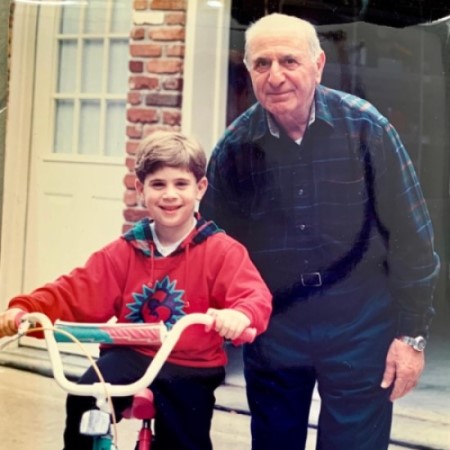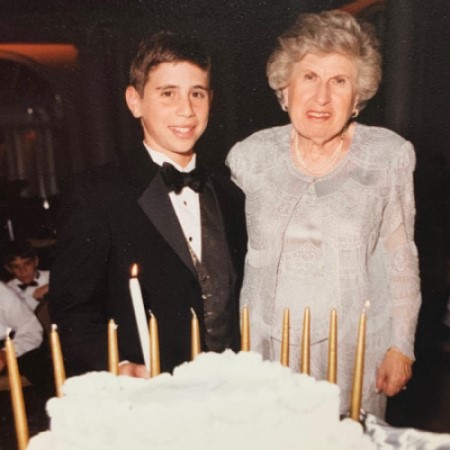 Yom HaShoah (Holocaust Remembrance Day) is a time when people in Israel come together not only to mourn the memories of the six million Jews who perished in the Holocaust, but also to pay tribute to the survivors and the legacies they built when they resurrected their lives after the war. Team Israel pitcher Jeremy Bleich shared the story of his grandparents, Yolanda and George Bleich, who were both survivors.
Yom HaShoah (Holocaust Remembrance Day) is a time when people in Israel come together not only to mourn the memories of the six million Jews who perished in the Holocaust, but also to pay tribute to the survivors and the legacies they built when they resurrected their lives after the war. Team Israel pitcher Jeremy Bleich shared the story of his grandparents, Yolanda and George Bleich, who were both survivors.
George, who was from Poland, was taken to the concentration camps when he was 25 years old and survived thanks to his skills as a leatherman who could make and repair soldier’s boots. Yolanda was from an area of Czechoslovakia that is now Ukraine. She was taken away at age 17 and spent time at several different camps, including Auschwitz, and was put to work stuffing gun powder into Nazi bombs. From a large family, she had at least seven siblings who were killed in the Holocaust. After the war, they each spent time in DP camps in south Germany deciding where to go next. They were ultimately sponsored to emigrate to the United States, where they met, married and raised a family.
Jeremy's earliest memories of hearing about the Holocaust are from his parents watching the movie Schindler's Listand telling him to leave the room at certain parts. "I was always curious, but was afraid to ask," he explained. "I would get tidbits just from conversations and I would figure things out."
His grandfather passed away before Jeremy was old enough to ask about war. In his late teens, Jeremy summoned up the courage to talk to his grandmother about her experiences: "I felt like she was getting older and we had never really spoken about it. The grandkids weren’t really exposed to it. And I remember asking, kind of probing her to get more information. I asked her if anyone ever acted out. She said people tried to just say nothing, do what they were told and stay quiet.
“Just hearing her say that, my little grandmother, the grittiness, the toughness, the at-times desensitized approach that allowed her to get through life – she lived in the same building in Brooklyn for 60-odd years, never wanted to move out. That was all a product of the experiences she had as a teenager."
Over time, Jeremy has come to understand the different ways his grandparents' experiences affected his father and, in turn, himself. He feels that the importance of family, his protectiveness of those he is close to and his desire to bring people together come from that.
 Last summer Jeremy went to Germany for the first time to play for Israel at the European championships and met a shopkeeper who asked him what he was doing there. Upon learning that Jeremy was representing Israel and thus Jewish, there was a long pause, after which the owner simply said, "I’m so sorry," and walked away. That experience, which he described as "surreal," stayed with Jeremy.
Last summer Jeremy went to Germany for the first time to play for Israel at the European championships and met a shopkeeper who asked him what he was doing there. Upon learning that Jeremy was representing Israel and thus Jewish, there was a long pause, after which the owner simply said, "I’m so sorry," and walked away. That experience, which he described as "surreal," stayed with Jeremy.
"[The Holocaust] really wasn’t that long ago when you think about it. That scares me," Jeremy said. “I think it still hits home as I get older and start to learn about the family. My father passed away five years ago and I was kind of forced to grow up at that moment. I look at some of his personality traits and why he acted certain ways. He was most definitely a product of a first-generation Holocaust survivor and I think as time goes on, as I get older, I start to put the pieces together and understand the big picture. There’s a lot of good literature out there about what happened and its effect on people and I think we as a Jewish community need to continue to learn about, to understand and to hold close to our hearts."
Being the grandchild of Holocaust survivors is at the core of who Jeremy is. It’s something he carries with him at all times and that inspires him when times are tough.
“Sometimes when you have to dig a little deep and you have to figure out who you are, you have to take control against someone or something that makes you uncomfortable, think about what the people did before you. I know what the people did before me and it’s a very strengthening feeling."
The Jewish roots that Yolanda and George Bleich planted after the war continue to bear fruit in many ways. For Jeremy, being Jewish - and playing for Team Israel - is simply who he is.
“One of the many reasons that I was raised Jewish, I want my kids to be raised Jewish, I want a Jewish family, the culture and community feel is because my grandparents sacrificed what they did and if it weren’t for that, I wouldn’t be here," he summed up. “That’s something that words don't do justice. That's the reason that I am who I am."
